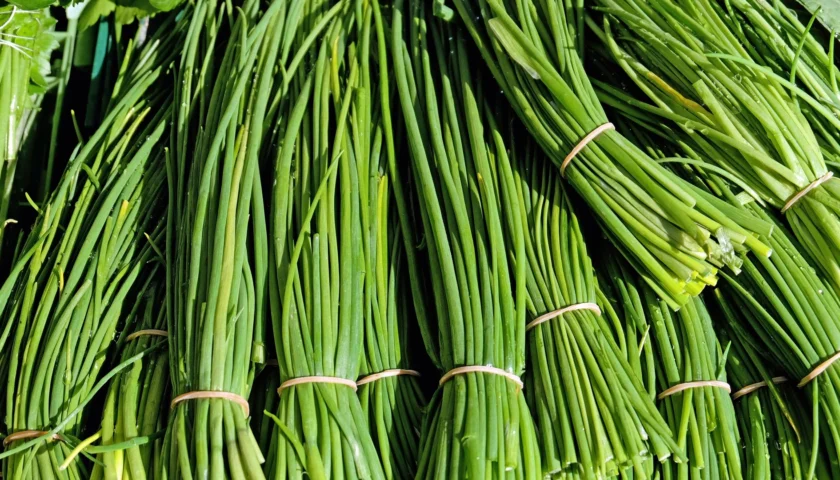About Chives
Chives belong to the allium family, which makes them relatives of onions, leeks, scallions, and garlic. They have been used in Europe and Asia for hundreds of years but can be found around the world. Chives produce vegetables and flowers; Long green grass, pencil-shaped and thin, with a hollow stem like grass.
They grow in large clumps, are happy and are often one of the first plants to appear in the garden in the spring. Chives do not require much preparation since they are often used fresh, fresh and as a garnish. A little goes a long way – you don’t need a lot to make a sweet impression. They are widely available in grocery stores, so they are cheap.
How to grow chives

Not only will cinch chives start growing, but they are perennials, meaning they will grow in your garden for years to come! Chives are hardy to grow in zones 3 to 10. One way to grow chives is to divide an existing plant – ask a neighbor or family member if they will dig for you. Or you can grow chives from seed.
The seeds are small, about the size and color of poppy seeds. Plant them 1/4 inch deep in well-drained soil. You can plant them to grow in a clump or in a tidy row in your vegetable garden. Chives are a good choice for growing herbs, and you can plant them in your garden.
When to harvest chives
Chives are ready to harvest once they reach six inches in height. Choose stems that are firm without browning and cut them with sharp scissors. The plant will grow leaves all the time, so collect them regularly.
When the purple flowers appear in early summer, you have two options: cut them off immediately as the plant’s vigor goes to leaf growth, or let the flowers remain until they dry and fall. At this time, they are full of seeds (more than 100 seeds per flower head). Cut them so you don’t spoil the seeds – you can save these seeds to plant next year
How to store chives
Use fresh or frozen chives (freeze the leaves in an airtight container). Dried chives lose their flavor.
Store chives in a resealable bag in the refrigerator.
Health Benefits
Vegetables are excellent sources of healthy nutrients. Chives contain a range of beneficial nutrients that may provide some health benefits, including anti-cancer effects.
Improve heart health
The heart can be thought of as the central transport station of the whole body. It controls life-sustaining events; without it, no one will live. Healthy eating promotes heart health and prevents heart disease later in life. Chives prevent the expansion of arteries and the formation of atherosclerotic plaques.
Daily consumption of allicin found in the leaves of the plant reduces the level of bad cholesterol (LDL) in the body and regulates the amount of good cholesterol (HDL) in the body. Thanks to Allicin, blood flow from the heart to other parts of the body is regulated in many ways. Chives also contain potassium, which helps prevent heart problems such as depression, heart attack and high blood pressure, and reduces the stiffness of blood vessels.
Potassium lowers blood pressure by improving the expansion of blood vessels, reduces blood clotting resistance and generally contributes to blood health.
Can improve Eye Vision
When the eye is in their best performance, performance and concentration and concentration makes better the same way. A good food that has something that can help the hand. Vitamin A improves clear and sharp vision.
Chives contain vitamin A in higher amounts than many other vegetables in the allium family, which is why they may support eye health. The green leaves of chives contain flavonoid-phenolic antioxidants such as beta-Carotene, Zeaxanthin and Lutein, which work well to assist in proper vision, delay age related breakdown to the macula and preserve the health of the optic nerve.
Cancer
Research has linked a high intake of vegetables to a reduced risk of many types of cancer. Some studies have specifically shown that allium vegetables, including chives, may have anti-cancer effects. For example, a 2019 review from a trusted source compiled research linking 16 different types of allium vegetables to prevent or positively affect cancer.
The authors identified the compounds S-allyl mercaptocysteine , quercetin, flavonoids and ajoene for their potential anti-cancer properties. A study of 285 women found that garlic and leeks were associated with a reduced risk of breast cancer. However, the authors also suggest that eating large amounts of cooked onion may increase the risk of breast cancer.
In addition, a 2015 review of studies reports that eating allium vegetables can reduce the risk of cancer, especially colon cancer. This is due to their sulfur compounds and antimicrobial effects. Allium vegetables and its components can have an effect on different stages of cancer and can affect biological processes that modify human risk.
The authors of the study explained that although allium vegetables may help prevent cancer, more studies have examined the effect of garlic and onion on cancer than that of chives. Therefore, researchers need to do more studies before they can determine how much people should eat for this effect, as well as the effectiveness of other interventions.
Sleep and mood
Chives are low in choline. Choline is an important nutrient that helps maintain the structure of cellular membranes. Choline also helps with mood, memory, body control, and other brain and nervous system functions. According to the Office of Dietary Supplements (ODS) Trusted Source, the recommended intake (AI) of choline is 550 mg per day for adults and 425 mg per day for older women.
Chives are low in choline: 0.16 mg per tablespoon. One would need to eat large amounts of chives and other choline-rich foods to get the recommended AI.
